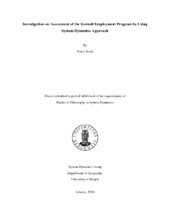Investigation on Assessment of the Karnali Employment Program by Using System Dynamics Approach
Master thesis
Permanent lenke
https://hdl.handle.net/1956/17421Utgivelsesdato
2018-02-03Metadata
Vis full innførselSamlinger
- Department of Geography [634]
Sammendrag
Karnali Employment Program (KEP) is employment led poverty reduction program initiated by the Government of Nepal in 2006 through its budget speech with an initial amount of NRS. 180 million. It aimed to provide safety net to ultra-poor household through short-term employment against seasonality and other shocks. The KEP aimed to providing 100 days of guaranteed wage employment to at least one unemployed family member in every household. The program failed miserably and KEP was only able to achieve 15 to 10 days of employment to the poor household of Karnali Region since its inception. Since, this intervention program impacts the labor market and socio-economic condition of Karnali Zone, it is necessary to evaluate the challenges that lead to the failure of implementing KEP. Therefore, to evaluate the failure of this program, system dynamics approaches was used to analyze the shortcomings of KEP program and to draw lessons for future policies implementation. To analyze the failure of the program five models: the population chain, labor demand, labor supply, government budget and agriculture were modelled explicitly to explain the dynamic problem of the study. The behavior of these models strongly indicated that failure to hire skilled employees and failure to recognize the targeted ultra-poor household led to underperformance of the program. To address this dynamic problem, policies such as hiring skilled employees according to the requirement of project and providing employment to the percentage of people who are identified as ultra-poor are induced in the model. The outcome of this policy showed an improvement in number of employment days provided by KEP. The employment days increased from 15 to 98 days which is quite close to the original target of 100 days. Therefore, to properly implement KEP, Government of Nepal should exert its resources in properly identifying and targeting the ultra-poor employees in order to implement programs like KEP successfully.
